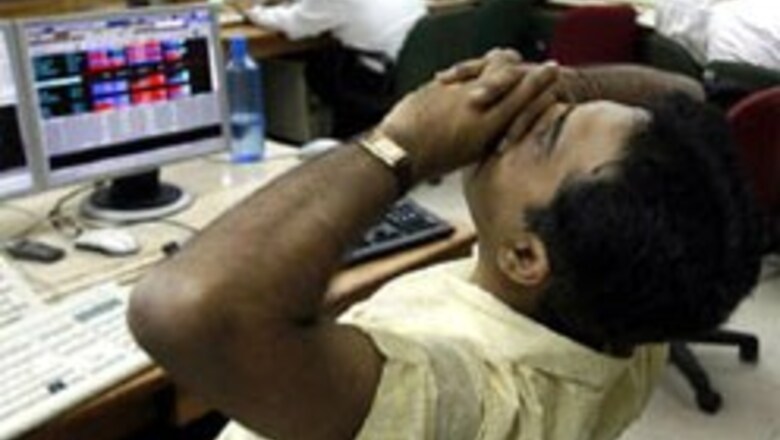
views
Washington: Poor economic data around the world and another international barrage of corporate profit warnings and job cut announcements intensified fears of deep global recession on Friday.
Seventy-nine years to the day after the 1929 crash that led into the Great Depression, currencies experienced almost unprecedented volatility, oil and other commodities tumbled on fears of plummeting demand that would accompany a slowdown, and stock markets dropped from Tokyo to New York.
"I sense we've moved beyond the credit crisis. There's a recognition of the damage inflicted on the global economy ... by the credit crisis," said Mike Lenhoff, chief strategist at Brewin Dolphin Securities in London.
"It's not just limited to the developed world. You can run but you can't hide anywhere." Reports of the euro zone's private economy shrinking this month at the fastest pace since monetary union and a much deeper-than-expected contraction in Britain's economy in the third quarter led many analysts to declare "recession." The financial crisis, set off by a U S housing market collapse nearly 15 months ago, claimed another victim.
PNC Financial Services Group Inc's, the first regional bank to participate in the Treasury's $250 billion capital infusion program for banks, agreed to purchase ailing Ohio-based National City Corp in a government-supported $6 billion deal.
The purchase of National City, which been crippled by its soured mortgage loans, will create the No. 5 US bank by deposits.
Meanwhile, the US government will allow banks to be the first to announce Treasury Department capital infusions, backtracking from a plan to announce a list of some 20 banks as early as Friday, according to a source familiar with Treasury's plans.
The US Treasury Department was closely studying how it could give relief to bond and mortgage insurance companies under the $700 billion US financial services rescue package, two sources familiar with the deliberations said. Washington may also bail out the auto industry.
General Motors has intensified negotiations to buy Chrysler's auto operations, but intends to seek US government support for any deal, people familiar with the talks told Reuters.
Foreign exchange markets were rocked by extreme volatility, with the yen soaring to multiyear highs against the dollar and euro. The euro fell 10 percent against the yen at one point, kindling speculation over how central banks might respond.
Canada's finance minister said the country is headed for tough times, although it is better able to withstand them than most other countries in the West. "These are difficult times.
Canadians should not underestimate what we're facing. We're not an island. We're a trading nation," Finance Minister Jim Flaherty told a news conference. China warned the outlook for the world economy was grim.
"The global financial crisis has been constantly spreading and worsening, creating a severe shock to global economic growth," Chinese Premier Wen Jiabao told an Asia-Europe Meeting of 27 European Union member states and 16 Asian nations.
The pace of US existing-home sales rose in September, but a Reuters poll of economists suggested battered US housing prices will fall into next year and a possible recovery in 2010 will be meek at best.
Stock markets fell around the world as investors panicked. Japan's Nikkei index ended down 9.6 percent, and European shares dropped 5.4 percent to close at their lowest level in more than five years.
Russia suspended trading on its stock market until at least Tuesday after the market lost more than 13 percent of its value, hitting its lowest levels since late 2004. Wall Street also ended at 5-1/2-year lows, but the bloodbath was not as bad as expected.
The Dow Jones industrial average slid 312.30 points, or 3.59 percent, to 8,378.95, while the Standard & Poor's 500 Index dropped 31.34 points, or 3.45 percent, to 876.77. The Nasdaq Composite Index was down 51.88 points, or 3.23 percent, at 1,552.03.
The Nasdaq hit its lowest intraday level, at 1,493.79, since May 2003. "We believe the economy is in a recession and project real GDP to grow only 1.6 percent in 2008 before falling 0.1 percent in 2009," said Diane Vazza, head of global fixed income research at US rating agency Standard & Poor's.
OPEC agreed to cut oil output by 1.5 million barrels per day in a bid to halt a steep slide in prices. But the price of US crude fell more than 5 percent, below $64 as economic gloom overshadowed the cut. Except for gold, which closed up in New York in a safe-haven bid, other commodities from copper and zinc to sugar and coffee were battered by sharp selling -- bad news for emerging market economies that are major producers.
A recent global money markets thaw appeared to be halting as recession concerns brought focus back to counterparty risk and raised expectations of sharp interest rate cuts.
The cost of borrowing overnight dollars rose and sterling overnight rates increased. Bad news continued to flow from a range of international corporations.
US carmaker Chrysler said it was slashing about 5,000 white-collar jobs and industrial conglomerate ITT planned to cut an unspecified number of positions. Sony's shares plunged to a 13-year low after it halved its profit forecast. Samsung posted a 44 percent drop in quarterly profit.
French carmaker PSA Peugeot Citroen said it planned "massive" production cuts in the fourth quarter after a 5.2 percent fall in third-quarter sales. Europe's largest airline group, Air France-KLM, issued a profit warning.
The US agency that insures corporate pensions reassured worried retirees that it has enough money to pay long-term benefits, despite some $4 billion in investment losses and ongoing economic turmoil. "The people who depend on us should not be concerned," Charles Millard, director of the Pension Benefit Guaranty Corp, told a congressional hearing.




















Comments
0 comment